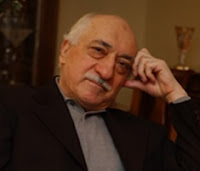Turkey woke up to an indescribable sorrow on Wednesday morning. Hundreds of Kurdistan Workers’ Party (PKK) terrorists launched simultaneous attacks against eight different spots in the Çukurca district of Hakkari, slaughtering 24 young soldiers and wounding 22 others in the spring of their lives.
People are quite right to ask why security forces failed to take adequate security measures in the region to protect both themselves and the country despite the fact that the terrorist organization will have increased concerns about its survival and act with these concerns in mind, as there have been refreshed hopes that the work on drafting a new constitution will remove the remaining traces of the Kurdish issue, which has already been diminished thanks to the democratic reforms implemented so far.
 |
| Fethullah Gulen |
It is impossible not to be confused about the resulting death toll and develop suspicions about some dark points. Thanks to the recent disclosures and confessions by a former commander of the Dağlıca military outpost, Onur Dirik, the general public can now learn that the controversial terrorist attack on this outpost -- which also occurred at a critical time in 2007 -- was the result of several acts of omission and treason within the Turkish military. For this reason, it is a must that the government, judicial authorities, Parliament and the presidential inspection board conduct multi-level investigations into the acts of omission and treason behind the bloody terrorist attack that occurred on Wednesday and claimed the lives of our 24 young soldiers.
Also, as noted by Mr. Gülen, the authorities responsible for the omission and -- should I say -- treason in this grave picture because they failed to take the necessary measures and precautions against the attacks “despite all the intelligence on hand” must pay a price. As was the case with similar attacks in the past, the latest attack targeted military reserve officers or, as was the case with the latest Çukurca attack, a troop where the highest ranking officer was a young lieutenant. If there are still problems with the technical or training facilities available to the security forces, the relevant military and civilian authorities must answer for it. The media and civil society organizations must exert continued pressure on the government and public authorities to ensure that the necessary probes are launched and those who were negligent or culpable are tried. To prevent future omissions or treason that would claim the lives of other young people in the prime of their lives, those responsible for the current attack must be brought to justice. We, as journalists, are responsible for following up and monitoring developments in this respect.
Also, our fellow Kurds -- with whom we have coexisted in this land for several thousand years and melted in the same pot into a single body -- should call into question at full length the real motives of the terrorist PKK in increasing its use of violence as Turkey democratizes, and causing greater bloodshed as Turkey becomes more civilian, and raising the tone of its threatening language as the country develops further. It is true that the pains our Kurdish citizens endured were the outcome of centuries of prolonged negligence and ill-wrought policies, but our Kurdish friends are at a point where they should clearly fathom that the casual link between the Kurdish issue and the PKK is growing weaker day-by-day, and has even already been severed for the time being. As the Turkish military has turned all citizens into slaves of its power for decades (which, thank God, is coming to an end), our Kurdish citizens should prevent the bloodthirsty PKK from doing the same to them. Our Kurdish sisters and brothers should wonder why the threat of terrorism posed by the PKK becomes a graver concern as the magnitude of the Kurdish issue is on the wane and they should seek to find the cause of such a paradoxical situation.
If our Kurdish sisters and brothers feel uneasy about the country’s democratization, demilitarization, liberalization and development as the terrorist PKK does, then there is nothing we can tell them. Yet, if they have the conviction that Turkey will become a more habitable country that we hope they will feel attached to with greater sense of belonging after the passage of a new constitution and if they think that the PKK aims to hamper this progress, then they must surely speak up and firmly voice their opposition to the PKK’s killings and terrorizing acts in their name.
Like the role the remnants of the old Turkey plays in the terror incidents that escalate as the Kurdish issue diminishes and as the hopes for solving it increase, the real purpose of the terrorist PKK -- which is after nothing but a sphere of power for itself and ensuring its survival -- in fueling violence must be questioned. We must also ask who the PKK is acting as a subcontractor for in the unstable environment of the Middle East and who it is being used by as a tool to undermine Turkey’s progress. We must also question why the PKK, which is known to be guided by certain foreign powers, particularly Syria, Iran and Israel, which are disturbed by Turkey’s increasing power, is being instructed by these countries to hamper Turkey’s growth, development and liberalization instead of allowing the initiatives designed to solve the problems experienced by Kurds.
Do you think it is simply a coincidence that the latest attack was ordered by Bahoz Erdal of Syria and that the militants used in the attack were affiliated with the Party for a Free Life in Kurdistan (PJAK), the PKK’s Iranian offshoot, which was pacified in a deal of non-aggression with Iran? This deserves to be pondered.
Published on Today's Zaman, 20 October 2011, Thursday
